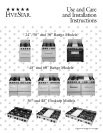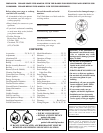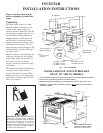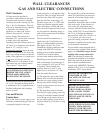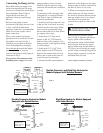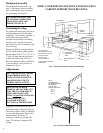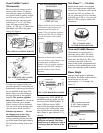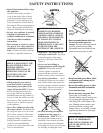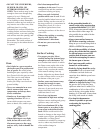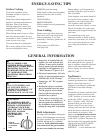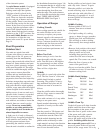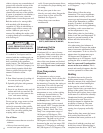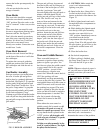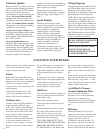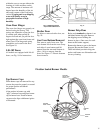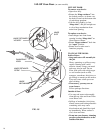
Wall Clearances
All units must be installed in
accordance with minimum side wall
clearances and clearances extended
vertically above the cooking top. See
Figs. 1 & 6 for illustration. This unit
may not be installed directly adjacent
to sidewalls, tall cabinets, tall
appliances, or other side vertical
surfaces above the 36” cooking
surface height. There must be a
minimum of 6” vertical side clearance
to either side of the appliance
extending from the cooking surface to
18” above to a maximum wall cabinet
depth of 13”, see Figs. 1 & 6.
Comb
ustible surfaces above the unit
must be a minimum of 40” above the
unit’s top cooking surface for the full
width of the appliance if a range hood
is not
used. If a hood is used we
recommend 30” to the bottom of the
hood above the top cooking surface
(Top of hood 7’ from floor).
FiveStar hoods may be installed from
24” to 36” above the cooking surface.
A minimum of 28” is required when a
FiveStar backsplash with warming
shelves is used.
ANY OPENINGS IN THE WALL
BEHIND THE UNIT AND IN
THE FLOOR UNDER THE
RANGE MUST BE SEALED.
BEFORE PLACING THE
RANGE IN OPERATION
CHECK FOR GAS LEAKS
WITH A SOAPY WATER
SOLUTION. DO NOT USE AN
OPEN FLAME TO CHECK
FOR LEAKS.
INSTALLER: INFORM THE
CONSUMER OF THE
LOCATION OF THE GAS
SHUT-OFF VALVE.
NOTE: THESE INSTALLATION
INSTRUCTIONS SHOULD
REMAIN WITH THE UNIT
FOR FUTURE REFERENCE.
Gas and Electric
Connections
Plug in the electric power supply cord
and make certain that the gas stub-out
is prepared properly for the gas
connection prior to moving the range
into place. The gas supply line must
be at least the same size or greater
than the inlet line of the range. All
FiveStar ranges use a
1
/
2” NPT inlet.
Check any installer-supplied intake
pipes and fittings visually and blow
them out with compressed air to clear
any dirt particles, threading chips, or
other foreign matter before installing
in a service line.
The Unit should be connected to a
supply line with
1
/2 inch black iron
pipe or a certified flexible connector,
(See Figure 3,4 & 5). For U.S.A.
installations, flexible connectors must
comply with ANSI Z21.69 (latest
edition) or for Canadian installation
CAN/CGA-6.16 (latest edition
revision) with suitable strain reliefs.
Manifold pressure should be checked
with a manometer. For natural gas 4”
wcp is required. For LP gas 10” wcp
is required. The incoming line
pressure must be at least 1” wcp
higher (but no more than 14” wcp)
than the manifold pressure.
(a) The appliance and its individual
shutoff valve must be disconnected
from the gas supply piping system
during any pressure testing of that
system at test pressures in excess of
1
/2 psig (3.5 kPa).
(b) The appliance must be isolated
from the gas supply piping system by
closing its individual manual shutoff
valve during any pressure testing of
the gas supply piping system at test
pressures equal to or less than
1
/2 psig
(3.5 kPa).
We suggest that you have the dealer
where you purchased your new unit
install it or have him arrange with a
local plumber to make the
installation. Installation must conform
with local codes. In the absence of
local codes, the installation must
conform with the National Fuel Gas
Code, ANSI Z223.1 Latest Edition in
the U.S.A. Canadian installations
must conform with CAN 1-B149.1 or
.2. To prevent gas leaks, use an
approved sealing compound, which is
resistant to liquefied petroleum gases,
on all threaded connections.
All gas models come equipped with a
three-wire (two conductor with ground)
supply cord. Dual-fuel ranges are not
supplied with a range connection
cord. The unit must be electrically
grounded and installed in accordance
with local codes. In the absence of
local codes the installation must
comply with ANSI/NFPA 70 (latest
edition) in the U.S.A. or for Canadian
installations C22.1 (latest edition).
WALL CLEARANCES
GAS AND ELECTRIC CONNECTIONS
4



